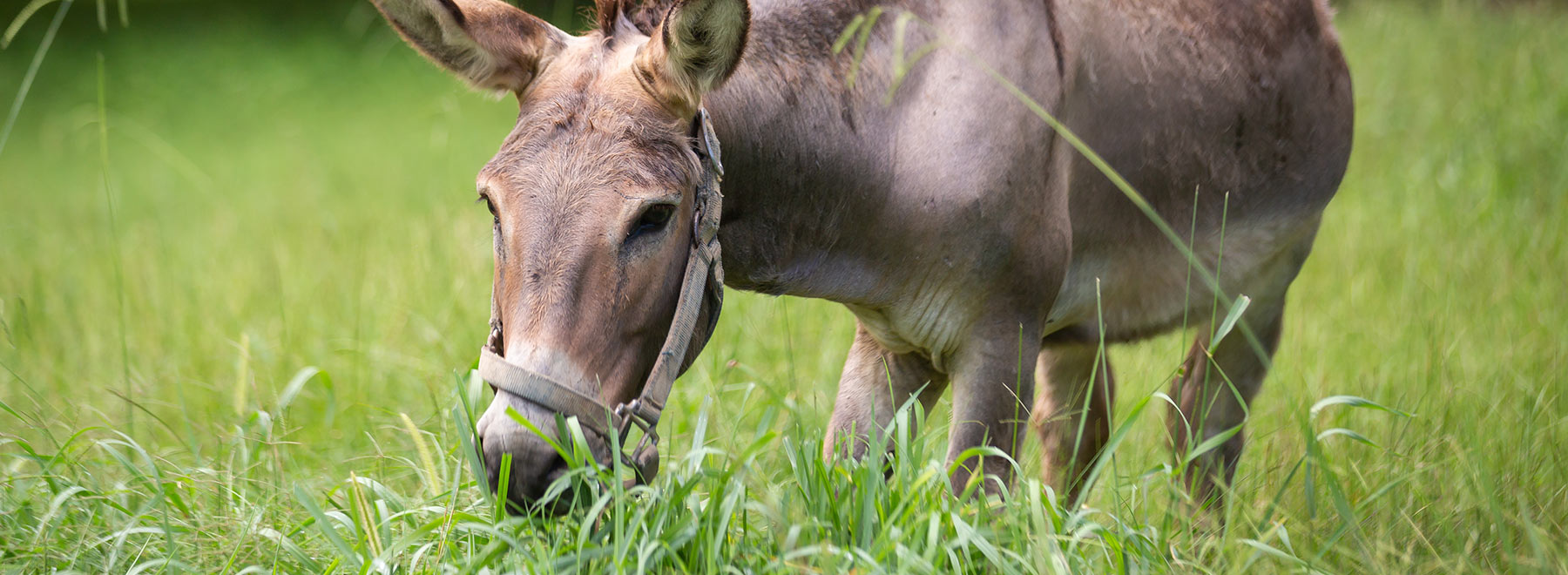AirCare, blood clotting drug save man from death by donkey bite
The day Bobo the donkey bit his owner’s calf so hard he almost bled to death, Bobo probably thought he had it worse.
The two of them on July 8 marked the one-year anniversary of an experience that left a berserk Bobo acting like his world had ended. That could have been the fate of Bobo’s then-owner, Ray Gustafson of Eupora, if AirCare, Mississippi’s most advanced medical helicopter transport owned and operated by the University of Mississippi Medical Center, hadn’t responded with a powerful drug in its arsenal used to put the brakes on profuse bleeding.
Gustafson thought he was a goner.
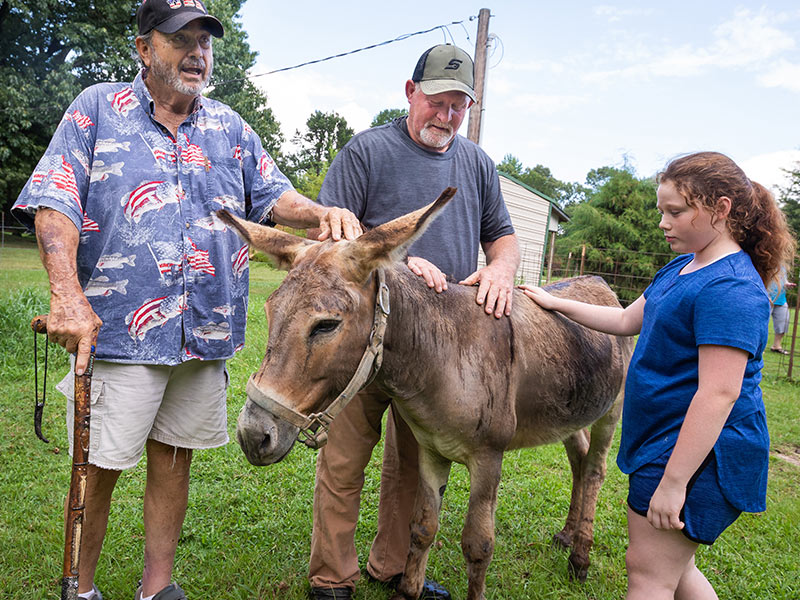
“They put me in the helicopter,” Gustafson remembered about that afternoon. “Subconsciously, I was waiting to see the bright light at the end of the tunnel. What I do remember vividly is that all of a sudden, I got overwhelmed with a sensation of extremely hot air. I thought I was in hell.
“I started yelling, ‘Hey! I’m not supposed to be here! I’ve been a good boy. I’m supposed to be in heaven!’”
The day should have been a fun one. Gustafson a couple of hours earlier had taken ownership of Bobo from his neighbor, Dale Wilson, so that he could hook him to a cart and give rides to his granddaughter Haley, then an 11-year-old. “He is a big donkey, and a little dude,” 73-year-old Gustafson said of Bobo.
“I had put him in a stall in my barn, and I was taking nails out of a door so that I could open it and let him out into the pasture,” Gustafson said. “Unbeknown to me, there was a yellow jacket nest in the ground inside the stall. They starting stinging him and me both.”
Making matters worse were Gustafson’s dogs patrolling around Bobo’s stall. Donkeys despise dogs, and Bobo was still getting used to them being part of the landscape.
Bobo “grabbed my right ankle and chomped down on it. I had the hammer in my hand and slapped him over the neck so that he would let go, and he sat down on the ground on his rear end,” he said. “I had one more nail left. I tried to get him out the door and into the pasture, and he grabbed me higher up, right above my Achilles tendon and just below the calf muscle. He bit half my leg, and then pulled back.”
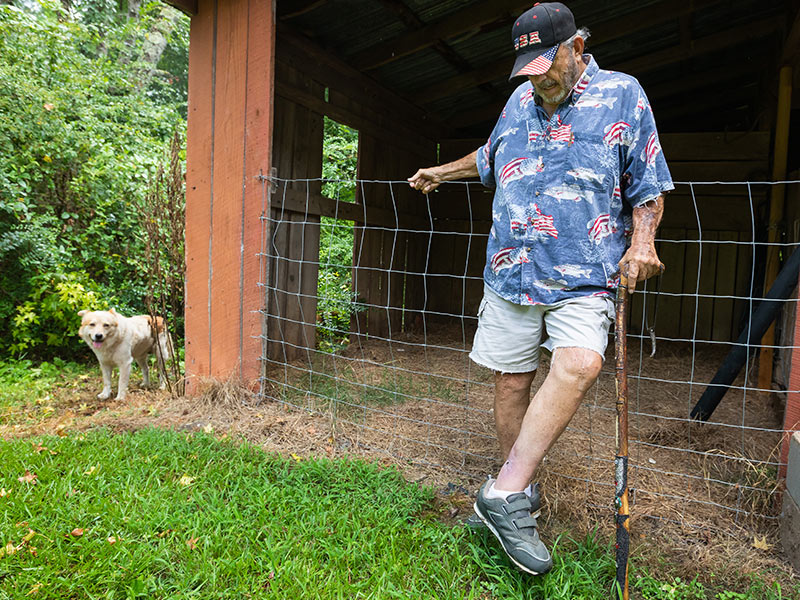
The donkey’s bite was bad enough, but made much more serious because Gustafson, a diabetic, takes anticoagulant drugs to keep his blood from easily clotting.
Haley was in the barn with him. “Bobo was rolling around. I turned around to keep working on that door to get him out of there, and Haley told me I was bleeding. I looked down, and the lower half of my leg was gone. You could see the bone and the tendons and all,” Gustafson said. “I said, ‘Haley, go get your grandmother. I’m not going to make it.’”
Betty, his wife of 52 years, came running. “About that time, I’d sat down on a bench from the bee stings and the loss of blood,” Gustafson said. “I passed out.”
Betty later filled him in on what happened next. She called Dale Wilson, the neighbor who’d given them Bobo that morning. “She called my son Jason, who’s done military medical training. He told her to get a cargo strap in the barn and put it above my knee and make a tourniquet out of it,” Ray Gustafson said.
“We thought he was gone. He’d turned gray,” Betty Gustafson said. Working together, she and Wilson wrapped the Army-green strap around Ray’s leg. “It was perfect. He almost went, but it wasn’t his time to go,” Betty said.
“I pulled it tight. He didn’t feel nothing,” Wilson said. “I said, ‘Betty, we’d better call 911. Ray ain’t looking too good.’ I thought, Ray ain’t going to make it.”
Scott Dean, a medic with North Mississippi Medical Center’s ambulance service, was the first responder on the scene, said Don Moore, who with fellow paramedic Brad Harper manned the AirCare flight summoned by Dean. That in itself was a game-changer for Ray.
Dean “knew what we had to offer,” Moore said. “One of the first things we thought was: How bad could it be? We weren’t expecting to walk into as serious a situation as we did.”
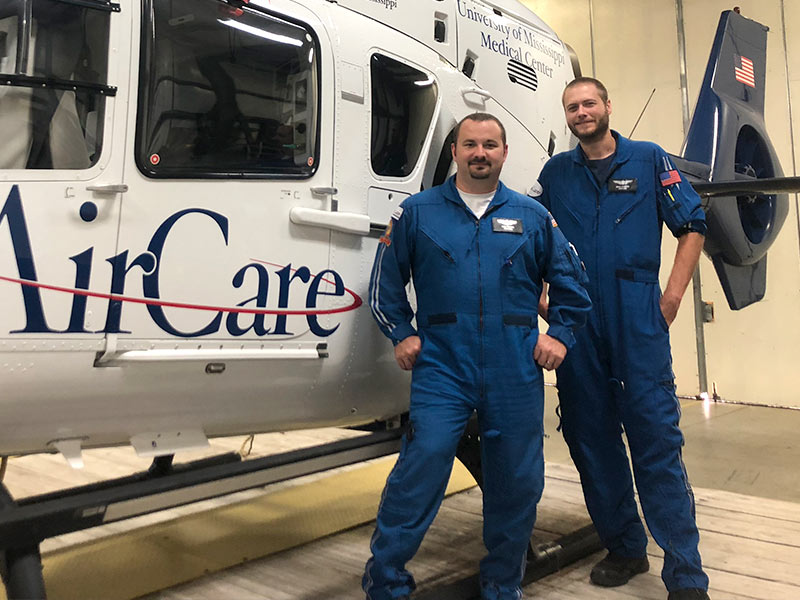
Moore and Harper traveled to Eupora from AirCare’s Columbus base. AirCare also flies from bases in Jackson, Meridian and Greenwood. After a 10-minute flight, they were met with a grisly scene. Gustafson “didn’t have the top third of his calf muscle. (Bobo) bit it through his pants and pulled it off,” Moore said.
Dean “leaned forward and was on the progressive side of medicine,” Moore said. “He had been able to talk to us early via radio, and to paint a picture of how sick Mr. Gustafson was and that he was on blood thinners. He knew what to tell us, and how to tell us.”
“He was a deadweight,” Betty said of her 250-pound husband. “It took four of us to load him on the stretcher.”
The ambulance met AirCare at the Eupora hospital, a campus of North Mississippi Medical Center. Moore and Harper quickly tested the level of anticoagulants in Gustafson’s system. It was high. “We started blood and liquid plasma,” Harper said. AirCare, unlike many air medical transports, always carries blood and blood products.
At the same time, the AirCare team gave Gustafson two medications to stop, or significantly slow, the loss of what blood he had left, and to keep him from losing what was being transfused. One drug was tranexamic acid, or TXA, commonly used to reduce bleeding by stabilizing the body’s response to trauma and blood clotting.
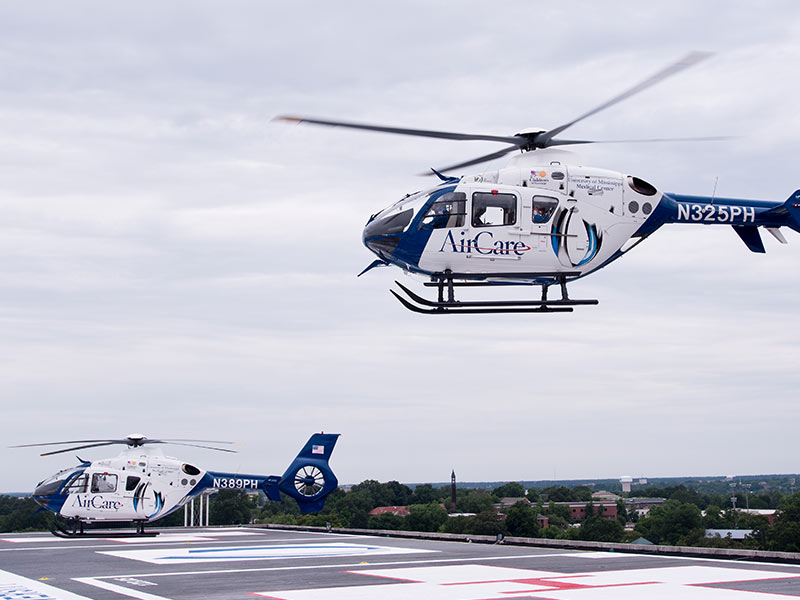
The other, however, was a medication carried onboard very few medical air transports nationally: prothrombin complex concentrate, often referred to by the trade name Kcentra, used in urgent situations to reverse anticoagulant drugs in a patient’s system. It’s reserved for acute major bleeding that occurs during trauma or urgent surgery on those traumatically injured.
AirCare is the only medical helicopter transport operating in the state that stocks and administrates prothrombin complex concentrate, or PCC. It and TXA “both have the same goal, but they work differently in the body to stop bleeding,” Harper said.
AirCare has given PCC more than 120 times since it began stocking it in 2014. “We were the first to be carrying this medication in the country, and we are one of the few (transports) in the country that has a protocol to deliver it,” said Dr. Damon Darsey, UMMC assistant professor of emergency medicine and a former AirCare paramedic. Academic Emergency Medicine Journal in October 2017 published an article written by a team of UMMC emergency physicians, a pharmacist and a toxicologist detailing the Medical Center’s program.
“By giving it in the field, we are saving a significant amount of time,” Darsey said. “Not all hospitals in the state have it. Some call us to give it, because we can give it so much faster.”
“If we had not had those two drugs, and the blood and plasma, I don’t think he would still be here,” Harper said of Gustafson.
The AirCare team also gave Gustafson IV antibiotics. “Farm animals are dirty,” Moore said. “Bites can be highly infectious. Antibiotics, started early, can have a significant impact. We were able to do all of that in 25-26 minutes.”
AirCare’s goal is to transport injured or sick patients to the nearest level of care they need. In this case, it was NMMC’s main hospital in Tupelo. Gustafson said he believes the rush of hot air that met him when he was unloaded there after a 25-minute flight made him believe he’d arrived at the doors of hell, rather than the pearly gates of heaven.
“It was a good one,” Gustafson said of the AirCare flight. “It took me from Eupora, to hell, then to heaven. They tell me I lost five and a half pints of blood.”
Gustafson believes Bobo’s bites brought him nearer to death than any of his former ills. “I’ve had two strokes, a quadruple heart bypass, three heart attacks, a spinal operation, a double knee replacement and 35 laser eye surgeries,” he said.
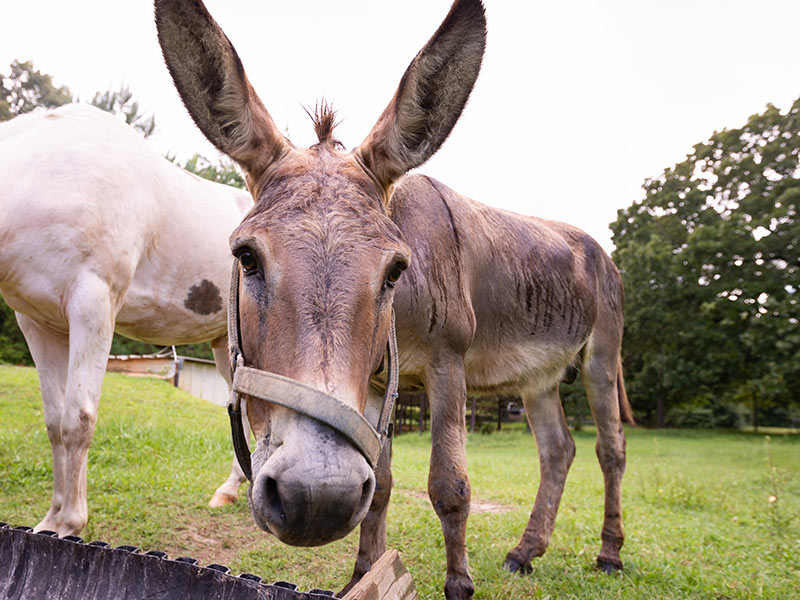
Bobo is a “Biblical donkey” because he has a cross marking on his back, Gustafson and Wilson say. “I blame myself for it,” Wilson said of his friend’s injury. “He is a good donkey. He don’t have a mean bone in his body.”
His calf and ankle have just about healed, save a small spot of scab, Gustafson said. “My neighbor came down and took Bobo back,” he said. “My granddaughter and I go down there and pet him. But, I stand farther back than I used to, and we make sure that Dale stands in between us.”
“Because of the training we do at UMMC, everything went very smoothly,” Moore said. “I can count on one hand the times each year that we can say, hands down, that we saved the person’s life.
“This was one that we snatched back from the jaws of death.”



